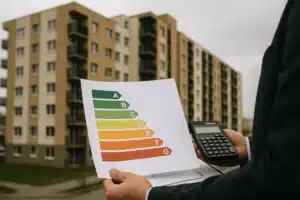
This post was last modified on October 2, 2025.
California’s Climate Disclosure Laws, particularly SB 253 and SB 261, primarily focus on large corporations, meaning individual home sellers often escape emissions reporting. However, this doesn’t eliminate the responsibility to disclose other material facts about your property. Understanding how these laws affect your obligations as a seller is important. What might this mean for your potential buyers and the overall market? Let us explore the implications further.
Overview of California’s Climate Disclosure Laws
California’s climate disclosure laws, primarily established through the Climate Corporate Data Accountability Act (SB 253) and the Climate-Related Financial Risk Act (SB 261), aim to enhance transparency regarding greenhouse gas emissions and climate-related financial risks.
These laws require large companies operating in California to disclose their greenhouse gas emissions, focusing on Scope 1, 2, and 3 emissions, starting in 2026. Companies with annual revenues over $1 billion must report Scope 1 and 2 emissions, while those with revenues exceeding $500 million need to disclose climate-related financial risks. Additionally, consumer protection laws are in place to help safeguard the interests of home sellers as they navigate these new requirements.
Scope and Applicability for Home Sellers
While the climate disclosure laws enacted through SB 253 and SB 261 primarily target large corporations, home sellers in California are largely exempt from these regulations.
Individual home sellers don’t meet the revenue thresholds outlined in these laws, meaning you’re not required to report greenhouse gas emissions or climate-related financial risks. Your focus remains on traditional real estate disclosure requirements, such as material facts about the property.
However, you should still maintain climate risk awareness, particularly regarding local environmental hazards, as these may need to be disclosed through Natural Hazard Disclosure reports. Additionally, being informed about property surveys can help you understand potential land issues that may affect the sale.
Ultimately, home seller exemptions from SB 253 and SB 261 simplify your obligations during the selling process, allowing you to concentrate on property-specific disclosures instead.
Reporting Requirements for Real Estate Transactions
As you navigate the real estate transaction process, it’s important to understand the reporting requirements that apply to greenhouse gas emissions and climate-related financial risks, particularly if you’re part of a larger entity.
Under California’s SB 253 and SB 261, entities with significant revenues must disclose Scope 1, 2, and 3 emissions and climate-related financial risks.
These reporting obligations impact real estate valuation, as transparency around a property’s environmental impact becomes increasingly important to buyers and investors.
Compliance timelines are tight, with initial reports due by 2026, necessitating early preparation.
Accurate reporting not only fulfills legal obligations but also enhances credibility, making your property more attractive in a market where sustainability is becoming a key consideration. Additionally, conducting due diligence can help identify potential environmental risks associated with your property that may affect compliance and valuation.
Implications for Buyers and Market Dynamics
The new climate disclosure laws are reshaping the environment for buyers in the real estate market.
As these laws enhance transparency regarding climate risks, you’ll find yourself making more informed decisions about your property investments. Properties highlighted as vulnerable to hazards may shift your risk tolerance, affecting your confidence in specific investments.
You might notice a growing demand for homes with lower emissions or better climate resilience, which could command premium pricing. This shift in preferences may alter market activity, leading to price differentiation based on climate risk exposure.
Additionally, as sellers invest in climate mitigation, you could see increased competition for sustainable properties, ultimately reshaping the future environment of real estate investment.
Frequently Asked Questions
How Will These Laws Affect Home Sale Timelines?
These laws can cause home sale delays by complicating disclosure processes. You’ll need more time to gather climate-related data, guarantee compliance, and potentially address buyer concerns, all of which lengthen your sale timeline significantly.
What Resources Are Available for Compliance Assistance?
You can access compliance workshops and online resources from CARB and legal advisories. These platforms provide key guidance, templates, and best practices to help you navigate California’s climate disclosure laws effectively and guarantee compliance.
Are There Penalties for Incomplete or Inaccurate Disclosures?
Yes, there are penalties for incomplete or inaccurate disclosures. Inaccurate reporting can lead to legal consequences, including fines. Ensuring disclosure accuracy is key to avoid potential penalties and maintain compliance with California’s regulations.
How Do Climate Disclosures Impact Home Insurance Rates?
Climate disclosures reveal climate risks, which can lead to increased insurance premiums for properties in vulnerable areas. Insurers adjust rates based on these disclosures, reflecting the potential dangers and encouraging homeowners to mitigate risks effectively.
Will These Laws Change Buyer Preferences in the Market?
Yes, these laws will likely shift buyer preferences, as heightened buyer concerns about climate risks influence market movements. Buyers will increasingly favor properties with low emissions and transparent disclosure, shaping future real estate trends significantly.




